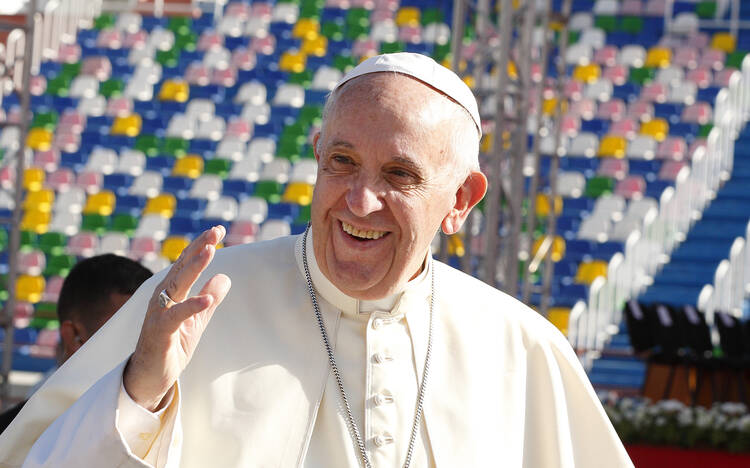In what has become an October tradition as reliable as pumpkin spice shaming, Catholic journalists in the United States will wake up a bit earlier than usual Friday morning to see if this is the year Pope Francis wins the Nobel Peace Prize.
The announcement will come from Oslo on Friday at 11 a.m., five o’clock New York time. Archbishop Desmond Tutu, a former Peace Prize–winner, announced in January that he nominated Pope Francis for his efforts in promoting sustainable development. This is the third year that the pope has been considered a strong contender for the prize, though he remains a long shot.
The Peace Research Institute Oslo, for example, did not include Pope Francis on its list of probable winners. Instead, they shortlisted a Russian human rights activist, individuals involved in crafting the 2015 Iran nuclear deal, volunteers saving lives in Syria known as the White Helmets, sexual-assault-victim advocates from the Democratic Republic of Congo and document-leaker Edward Snowden.
But even the most informed guesses rarely prove accurate, so it is possible that Francis will become the first pope ever to receive the prize.
There are more than a few good reasons why the five-person Nobel committee may pick the pope.
To start, Francis’ biggest diplomatic coup came in 2014, when he helped broker the thaw in relations between the United States and Cuba by writing personal letters to both President Barack Obama and Cuban President Raul Castro. He then went a step further, adding a last-minute stopover in Cuba before arriving in the United States last September, hammering home the point that nations separated by a mere 90 miles should act like neighbors.
Second, an issue important to many European leaders is climate change, and the pope has been on board in a major way. Last year, he urged the world to get serious about tackling threats to the planet, lending his moral capital to the cause with the release of his encyclical “Laudato Si’.”
When the encyclical was unveiled at the Vatican in June 2015, an atheist scientist was on hand to vouch for the science in the document and to show that collaboration between unlikely allies was the only way to meet the challenge. As is his style, Francis devoted much the document to explaining how environmental degradation and climate change disproportionately affects the poor—and he called on rich nations to do something about it.
A nod from the Nobel committee for the pope’s work on climate change would be nice timing, too.
“Laudato Si’” was said to have influenced discussion at the United Nations Climate Change Conference in Paris last December. The resulting treaty goes into effect next month.
Another possible reason for awarding Francis the prize is that he has turned the plight of refugees seeking resettlement in Europe into a global issue, beginning with his 2013 visit to the Italian island of Lampedusa. Earlier this year, he touched down on the island of Lesbos in Greece, where tens of thousands of migrants have arrived on rickety boats seeking entry into the European Union.
There the pope reiterated his call for the world to be more welcoming to migrants, and he put his words into action by bringing 12 Muslim refugees from Syria home with him aboard the papal plane. They were resettled in Rome as guests of the Vatican. He urged Catholic parishes throughout Europe to follow his lead.
But there are equally compelling reasons why Francis won’t be chosen from among the record-setting 376 nominees.
For starters, no pope has ever won.
Not John XXIII, who preached against nuclear weapons in the decades following Hiroshima and Nagasaki. Not even the wildly popular John Paul II, either for his fight against the spread of communism or for his vocal opposition to the 2003 U.S.-led invasion of Iraq. The most notable Catholic winner remains Mother Teresa, who snagged the prize in 1979.
Then there’s the question of whether pope really needs the prize.
With notable exceptions, such as President Obama’s win in 2009, the Peace Prize often goes to individuals or groups whose cause could benefit from being elevated on the global stage. It is hard to see how winning the prize would do much to enhance the pope’s message, and what’s more, the $1 million in prize money would likely benefit an unknown entity far more than the Holy See.
It could do more, for example, in the hands of Father Alejandro Solalinde, a priest who was nominated for helping Central American refugees resettle in Mexico, which has led to occasional imprisonment and constant threats of violence.
Finally, Pope Francis may not even want the prize.
According to Crux, he said in 2014 that he’s “never accepted honorary titles,” and he dismissed the notion that he is interested in becoming a Nobel Laureate.
“I don’t really think about those things, and even less about what I might do with that money,” he said. “The thing is, regardless of any award, I believe we should all be committed to global peace. We should all give peace a chance.”
If he were to win but declined the honor, the pope would not be alone.
Jean-Paul Sartre was awarded a prize for literature in 1964 but said he did not accept personal honors, and Vietnamese diplomat Le Duc Tho was awarded the peace prize in 1973, along with U.S. Secretary of State Henry Kissinger, but declined because of ongoing violence at home.
So with all that said, if Francis doesn’t win the prize on Friday, there’s always next year.
Michael O’Loughlinis the national correspondent for America and author of “The Tweetable Pope: A Spiritual Revolution in 140 Characters.” Follow him on Twitter at @mikeoloughlin.







